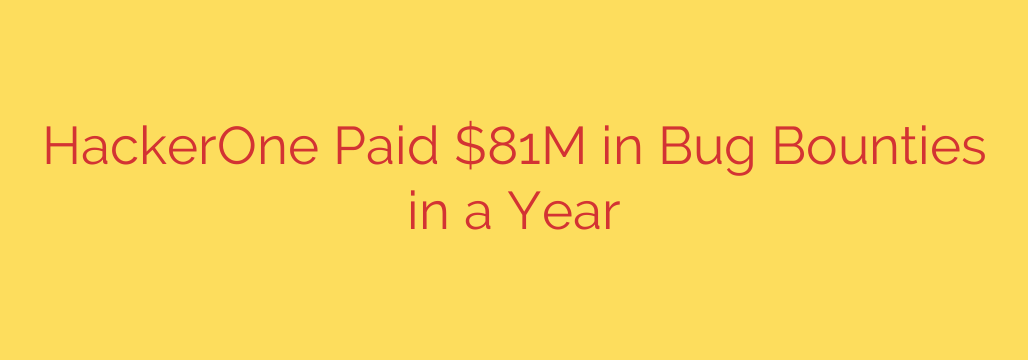
Ethical Hackers Earned $81 Million in a Year: Why Bug Bounties Are the Future of Security
The world of cybersecurity is undergoing a seismic shift. Instead of waiting for malicious actors to strike, leading organizations are proactively inviting skilled professionals to find and report security flaws. This collaborative approach, known as ethical hacking, is powered by bug bounty programs—and it’s proving to be incredibly effective.
In a landmark year for crowdsourced security, ethical hackers earned a staggering $81 million in bug bounties. This figure represents a massive 63% increase from the previous year, highlighting the explosive growth and increasing reliance on this innovative security model. It’s clear that bug bounty programs are no longer a niche strategy but a core component of modern digital defense.
The Numbers Behind the Trend
The scale of this movement is impressive. The $81 million in payouts was the result of ethical hackers successfully identifying and reporting over 65,000 valid software vulnerabilities. This brings the all-time total paid out through these platforms to more than $230 million, demonstrating a long-term commitment from companies to reward security research.
What kind of rewards are we talking about? While payouts vary based on severity, the median reward for a critical vulnerability now stands at $3,000. However, the most impactful and complex discoveries command life-changing sums, with some individual bug reports earning hackers well over $100,000 for a single finding. This level of compensation is attracting top talent from around the globe, creating a diverse and highly motivated community dedicated to making the internet safer.
Why Companies Are Investing Heavily in Bug Bounties
For businesses, the return on investment is undeniable. The cost of a data breach, including regulatory fines, reputational damage, and recovery expenses, can easily run into the millions. A bug bounty program offers a cost-effective and proactive alternative.
Key benefits for organizations include:
- Access to a Global Talent Pool: A single company’s security team is finite. Bug bounty programs tap into a global network of millions of registered researchers, each with unique skills and perspectives.
- Continuous Security Testing: Unlike a one-time penetration test, a bug bounty program provides constant, real-world testing of an organization’s digital assets.
- Cost-Effectiveness: Companies only pay for valid, actionable results. This pay-for-performance model is far more efficient than hiring a massive in-house team to cover every possible angle.
- Discovering Critical Flaws: Crowdsourced hackers are adept at finding high-impact vulnerabilities that automated scanners often miss, such as improper access control, information disclosure, and cross-site scripting (XSS).
The AI Frontier: A New Challenge and Opportunity
As artificial intelligence becomes more integrated into business operations, it also presents a new and complex attack surface. Recognizing this, forward-thinking companies are now specifically inviting ethical hackers to probe their AI and Large Language Model (LLM) deployments for weaknesses. This emerging field is a critical new frontier for security, where human creativity is essential to uncover novel exploits that could be used to manipulate or compromise AI systems.
Actionable Security Tips for Your Business
The success of bug bounty programs offers valuable lessons for any organization looking to strengthen its security posture.
- Embrace a Proactive Mindset: Don’t wait for an attack. The most secure companies are constantly looking for their own weaknesses. A vulnerability disclosure policy (VDP) is a great first step, providing a safe and legal channel for anyone to report a security issue.
- Consider a Private Bug Bounty Program: If a public program seems too daunting, start with a private, invite-only program. This allows you to collaborate with a smaller, vetted group of top researchers to test specific applications or features.
- Reward Fairly and Respond Quickly: The success of any security reporting program depends on trust. Acknowledge reports promptly, communicate openly with researchers, and offer rewards that are competitive and commensurate with the severity of the vulnerability discovered.
Ultimately, the message is clear: collaborative, crowdsourced security is no longer just an option—it’s a necessity. By partnering with the global ethical hacking community, organizations can identify and fix critical vulnerabilities before they can be exploited, building a more resilient and secure digital future for everyone.
Source: https://www.bleepingcomputer.com/news/security/hackerone-paid-81-million-in-bug-bounties-over-the-past-year/








